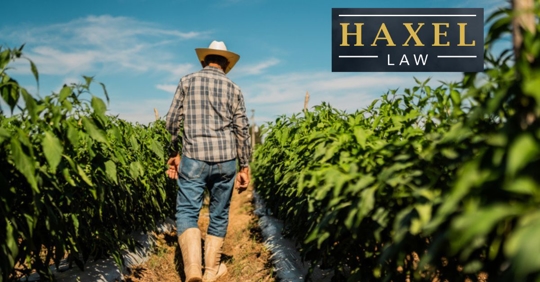Workers' Compensation in Agriculture: What You Need to Know
Farming is hard work. It’s the backbone of our food supply, but it comes with its fair share of challenges, especially when it comes to worker safety. For agricultural workers, injuries and illnesses aren't just possibilities; they’re real risks that come with the job. That’s why workers' compensation is so important.
It’s designed to help protect both employees and employers when accidents happen. If you’re in the agricultural sector, understanding how workers' compensation works can go a long way in ensuring everyone is cared for when something goes wrong.
What Is Workers' Compensation in Agriculture?
Workers' compensation is basically a safety net for farmworkers. It provides benefits like medical care, wage replacement, and rehabilitation support if someone gets hurt or sick on the job. Agriculture is a unique industry with its own set of rules, thanks to factors like seasonal labor and unpredictable working conditions.
Farmers and workers face a lot of risks that people in office jobs will never experience. For instance, heavy equipment, exposure to chemicals, and extreme weather all create hazards that require workplace-specific insurance and legal protection. That’s why understanding workers' compensation isn’t just useful; it’s crucial.
Why Agriculture Is Different
Unlike relatively controlled environments like offices or factories, farms are unpredictable. You’ve got workers dealing with changing weather, powerful machinery, and physical labor in environments where conditions can shift day to day. Temporary or seasonal workers also add layers of complexity when it comes to filing compensation claims. These unique challenges make industry-specific knowledge and preparation a must.
Common Injuries Agricultural Workers Face
Unfortunately, farm work comes with a lot of potential for injury. Here are some of the most common incidents that workers' compensation often covers in this field.
Machinery-Related Accidents
Farming equipment like tractors and combines are essential, but they can also be extremely dangerous. Whether it’s a severe accident resulting in broken bones or something less visible like repetitive stress injuries from operating the same machine all day, workers are constantly at risk around heavy machinery.
The best way to prevent these accidents? Regular equipment maintenance and safety training. Workers need to understand the risks and be equipped to handle machinery with confidence to avoid mishaps.
Chemical Exposure
Farmworkers frequently handle fertilizers, pesticides, and other chemicals that can harm their health if not managed properly. These substances often lead to immediate issues like skin irritation or respiratory problems and pose long-term risks such as cancer.
Wearing the right protective gear and following strict safety protocols can reduce exposure, but without comprehensive workers' compensation, a health emergency could spell financial disaster for employees and their families.
Environmental Risks
Working outdoors brings a different kind of challenge. Heat stress is a real problem during peak seasons, as long hours under a blazing sun can lead to exhaustion or heatstroke. Unsteady terrain and physically demanding tasks also increase the likelihood of falls or other injuries. Workers' compensation ensures that recovery costs are covered if injuries occur.
How to Navigate Workers’ Compensation Claims
Filing a workers' compensation claim can feel overwhelming, especially for agricultural workers who might not be familiar with the process. Here’s a simplified breakdown.
The Claims Process
If an injury happens, workers need to report it to their employer as soon as possible. That’s followed by filling out paperwork to submit to the employer's insurance provider. How quickly and accurately the paperwork is completed can affect whether or not the claim is approved.
Employers must ensure their teams understand the process and make accommodations like multilingual resources for workers who face language barriers. Clear communication is key to avoiding delays or misunderstandings.
Why Insurance Knowledge Matters
Farmers also need to fully understand what their insurance policies cover. Workers’ comp insurance is there to protect your business and your team, but not everyone realizes the limits and exclusions that might apply to their coverage. Ensuring you have the right policy can save you from surprises that could otherwise lead to significant financial and legal issues.
Preventing Accidents Through Training and Tech
While workers' compensation is vital, prevention is even better. Focusing on safety training and modernizing your farm with technology can significantly reduce accidents and injuries.
Training That Works
Regular safety workshops tailored to the realities of farm work go a long way. For example, hands-on training in chemical handling or simulated machinery operations helps workers better understand how to manage risks. Keeping these sessions frequent and up to date reinforces safety culture, helping everyone feel more confident and prepared.
Technology to the Rescue
New tools like automated farm equipment and wearable health monitors are game changers. Automated machinery minimizes direct human interaction with dangerous equipment, while sensors and wearables track conditions like heart rate or potential chemical exposure in real-time. Investing in technology doesn’t just protect workers; it also helps streamline operations for a more efficient farm.
A Helping Hand for Workers and Farmers
Resources are available to support you if you’re an agricultural worker or employer. Advocacy groups, bilingual programs, and published guidelines can help workers understand their rights and employers improve working conditions. Employers will also find value in partnering with these organizations to gain insights into compliance and best practices.
Put Safety and Security First
Agriculture is a demanding but crucial industry, and workers’ compensation ensures that employees and employers are protected when things don’t go according to plan. From understanding coverage specifics to prioritizing safety training and innovative tech, there are many steps you can take to create a safer, more secure environment for your team.
If you’re unsure about navigating workers’ compensation claims, Haxel Law is here to guide you. We specialize in helping agricultural workers and employers with their legal needs, so everyone can work confidently knowing they’re protected.
Call (217) 215-4166 today to speak with our team and ensure your rights are secured.

